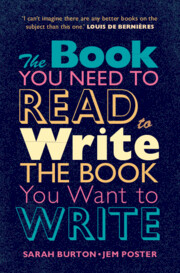Book contents
- Reviews
- The Book You Need to Read to Write the Book You Want to Write
- The Book You Need to Read to Write the Book You Want to Write
- Copyright page
- Dedication
- Contents
- Preface
- Acknowledgements
- – 1 – Getting started
- – 2 – Memory and imagination
- – 3 – Character
- – 4 – Plot and structure I
- – 5 – Plot and structure II
- – 6 – Form and length
- – 7 – Dialogue
- – 8 – Narrative viewpoint and narrative voice
- – 9 – Beginnings and endings; tension and pace
- – 10 – Description
- – 11 – Research
- – 12 – Drawing it all together
- – 13 – Publication and the writing life
- Notes
- Select bibliography
- Index
– 4 – - Plot and structure I
Published online by Cambridge University Press: 17 February 2022
- Reviews
- The Book You Need to Read to Write the Book You Want to Write
- The Book You Need to Read to Write the Book You Want to Write
- Copyright page
- Dedication
- Contents
- Preface
- Acknowledgements
- – 1 – Getting started
- – 2 – Memory and imagination
- – 3 – Character
- – 4 – Plot and structure I
- – 5 – Plot and structure II
- – 6 – Form and length
- – 7 – Dialogue
- – 8 – Narrative viewpoint and narrative voice
- – 9 – Beginnings and endings; tension and pace
- – 10 – Description
- – 11 – Research
- – 12 – Drawing it all together
- – 13 – Publication and the writing life
- Notes
- Select bibliography
- Index
Summary
The short story as a way into discussions of plot. The event-plot short story. Synchronised (reader and character) moments of discovery as a key pleasure in fiction. Poetic justice. The relationship of the character to the theme. The Chekhovian / slice-of-life / anti-plot short story. Plot is sidelined as a prime focus in favour of narratives reflective of human experience. Plot and time: plot is only available in retrospect and the location of the reader in – and in relationship to – the narrative defines the meaning of the story. Telling it slant: the usefulness of an indirect route to meaning.
‘Plot may depend not so much on a sequence of events unfolding chronologically as on what the protagonists and the reader know about the events and when they know it.’
- Type
- Chapter
- Information
- The Book You Need to Read to Write the Book You Want to WriteA Handbook for Fiction Writers, pp. 35 - 54Publisher: Cambridge University PressPrint publication year: 2022

